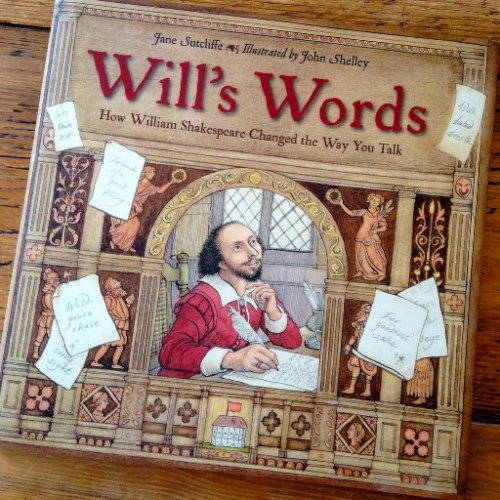
Back in my salad days, I crushed on Will Shakespeare. In high school I swooned over Romeo, in college I hissed at Iago’s villainous schemes, and as a starry-eyed rookie teacher did my best to convince my students that when it came to reading and studying the Bard of Avon, their labours of love were never lost.
I wish there had been a book like Will’s Words (Charlesbridge, 2016) to share with them then. The naysayers who struggled with and questioned the practical value of Shakespeare’s seemingly antiquated language could have seen (much to their amazement), how Will’s words weren’t so archaic or esoteric after all. In fact, many phrases have since become household words, regularly popping up in modern everyday speech. I like to think Will Shakespeare has made poets of us all. 🙂
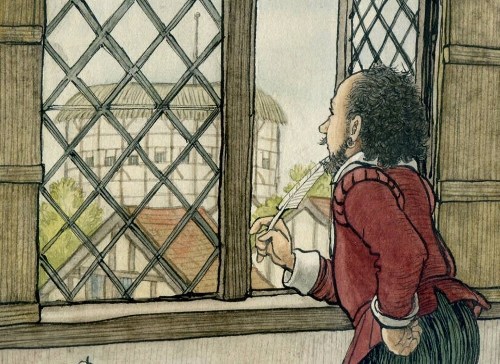
Author Jane Sutcliffe begins by confessing to the reader that she fully intended to write a book, in her own words, about the Globe Theatre and Shakespeare’s wordsmithing and storytelling genius in penning “the most brilliant and moving plays ever written.” But aye, there’s the rub: no matter how hard she tried, Shakespeare’s words kept bumping into hers — they were simply everywhere and impossible to ignore. So she did the next best thing: wrote a marvelous book cleverly incorporating Will’s colorful turns of phrase in her narrative. As an added treat — since when it comes to Will’s words it’s impossible to have too much of a good thing — she explains what his phrases mean and cites the plays in which they appear.
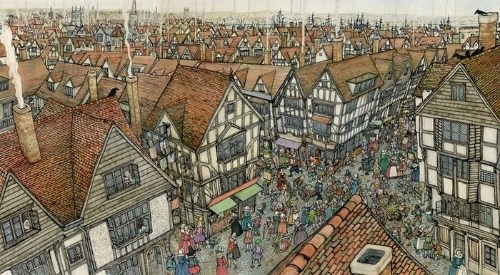
Wasting no time at all, she throws us right into the thick of Shakespeare’s world:
In 1606 London was a bustling, jostling, clanging, singing, stinking, head-chopping, pickpocketing wonder of a city. You would probably need a break from a city like that.
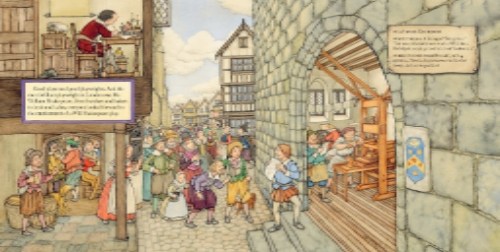
And what better break than a few hours at the theatre? In a lighthearted, conversational tone, Jane describes this play-going city, the throngs of people from all walks of life who frequented the playhouses, and the good times they had watching Will’s comedies, tragedies, and histories. Such enthusiasm and hunger for good storytelling! Such excitement whenever Will was on the playbill!
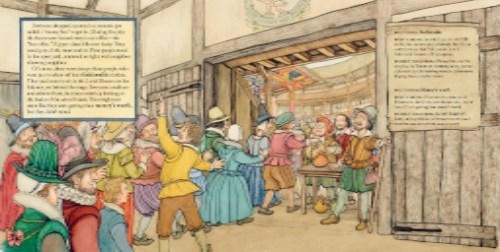
Ms. Sutcliffe includes just the kind of fetching theatrical detail young readers love: though one could buy refreshments like fruit, nuts, and beer, there were no restrooms; rich people could buy seats while poor people stood in an open yard crammed together; female roles were played by males; playgoers weren’t exactly the most well behaved (they made a lot of noise during the performances with their eating, talking, and belching).

It wasn’t particularly easy being an actor either. You might have to play several parts, perhaps for as many as six different plays a week. Forget your lines and you might be pelted with audience snacks. Though there were few props and only the occasional special effect, the costumes were gorgeous. All the more reason why Will’s words carried such tremendous import and understandably took center stage: he had to tell his stories in ways that would captivate and capture the attention of rich as well as poor, literate as well as illiterate, keeping the audience spellbound for hours in crowded, raucous conditions, sometimes in the cold and rain.
And when the audience went home, they took Will’s words with them.
An apprentice didn’t just complain that his master was stubborn. He said the man would not budge an inch.
A wife didn’t just say that her husband’s relatives were greedy. She grumbled that she was being eaten out of house and home.
Was a young man acting jealous? That was because he had been bitten by the green-eyed monster, his friends teased.
Luckily Will’s friends thought to publish his plays after he died. More and more people were then able to read and hear his words. After saying them for hundreds of years, people the world over eventually “forgot they were William Shakespeare’s words. His words became part of what we say every day.”

John Shelley’s masterful pen and ink and watercolor illustrations brim with meticulous detail and are a brilliant study in perspective. We are given panoramas of the city crammed with Tudor structures and teeming with a bustling populace, aerial views of the Globe, Garden and Rose theaters, as well as many interior scenes of the Globe from various vantage points.

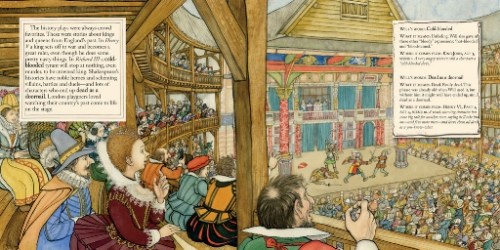
The reader can easily imagine what it would be like to be a groundling looking up at the stage or a member of the upper class seated in one of the balconies with a bird’s eye view of all the action. Wonder what goes on backstage with the players frantically putting on their costumes? Want a good view of those oh-so-fashionable peacocks perched in the Lords’ Rooms? If you were seated near Her Majesty Queen Elizabeth I, would you be too immersed in the play to give her a second glance? These are some of the great moments Shelley brings to life, along with multitudes of enthusiastic, enthralled, comical, jeering and jocund faces, each so vital and distinctive, we can just about hear these people boisterously interacting with the players to their heart’s content.
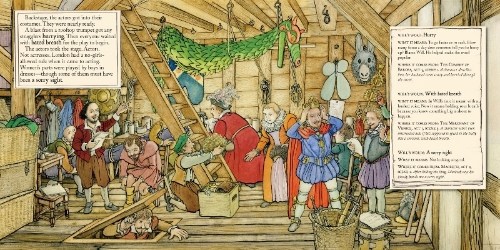
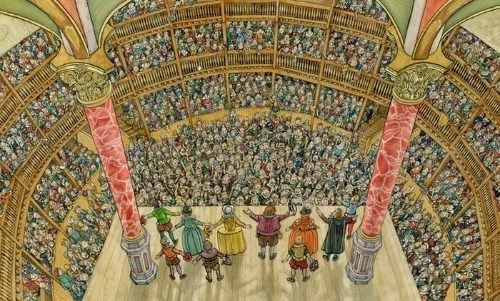
Keen-eyed munchkins will enjoy a 17th century version of Where’s Waldo, as they eagerly search for the ‘hidden Will’ in each spread. The architecture, costumes, props and street scenes are a mini history lesson in themselves and pull readers right into the story — listen for the street peddlers hawking their wares, their wooden carts rumbling over cobblestones, while groups of hurrying women catch the latest gossip and children run riot in their play.
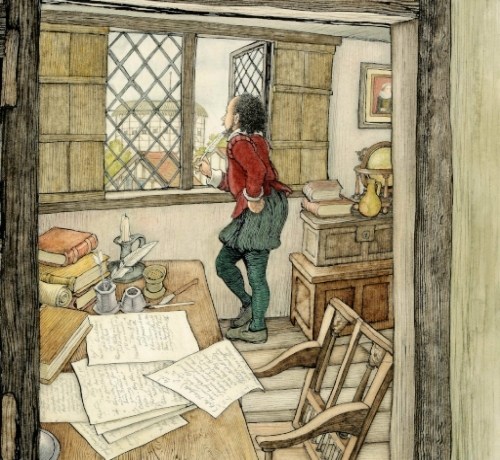
It’s good to know that in Shakespeare’s day live theatre was popular entertainment for everyone. The universal love of a good story is always worth celebrating. Focussing on Shakespeare’s singular ability to capture a wide range of human emotions by poetically enriching the colorful and dynamic vernacular of his time is a wonderful way to meet the greatest, most enduring writer in the English language, and spotlighting some of his commonly used phrases certainly makes his work accessible to kids.
I knew that phrases like “with bated breath,” “wild-goose chase,” and “what’s done is done” came from Shakespeare, but was surprised to learn that “amazement,” “excitement,” “outbreak,” and “fashionable” were either coined or popularized by him. It’s likely Will’s Words will send readers of all ages on a merry search for more Shakespeare-isms. They certainly won’t have to look very far.
Though some may say, ‘all’s well that ends well,’ I, for one, did not want this book to end. Is there no more cakes and ale?
*
🌹A COOKIE, A COOKIE, MY KINGDOM FOR A COOKIE🌹
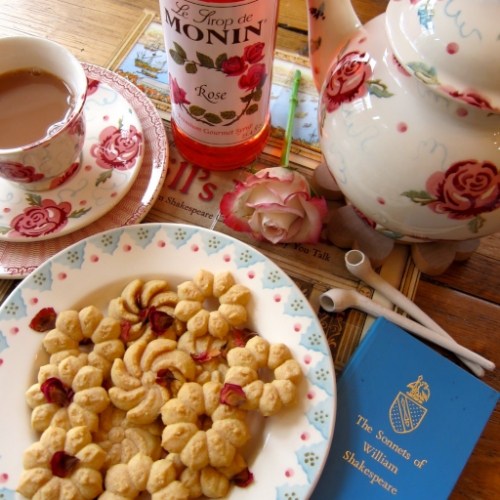
To eat or not to eat, is that even a question?
Since April is Shakespeare’s birth month, and 2016 marks 400 years since his death (also in April), it’s only fitting that we clink our teacups and nosh on a little something in his honor. Besides, reading about the audience snacks in Will’s Words made me hungry. 🙂
I love that Shakespeare mentions food in all his plays, and that the house where he was born in Stratford-upon-Avon had been a butcher shop and a string of pubs before it became a private residence. Will’s father John also served as Stratford’s chief ale taster beginning in 1557. Think of all the good foodie vibes permeating the walls of Will’s home — no wonder he grew up to be a literary genius! I wonder what he would have considered a dish fit for the Gods?
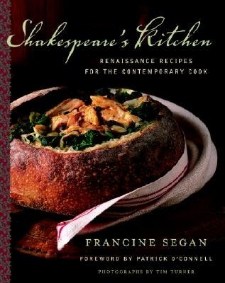 I found an appealing recipe for “1610 Rose Cakes” in Shakespeare’s Kitchen: Renaissance Recipes for the Contemporary Cook by Francine Segan, which contains updated recipes from classic 16th and 17th century cookbooks. In Shakespeare’s day the sweets course following a nobleman’s meal was called the “banquet.” Sugar was considered an aphrodisiac; “the banquet was specifically designed to ‘moveth pleasure and lust of the body.'” The banqueting dishes the sweets were served on had images or poems on them (often containing double entendres or sexual innuendos). Bawdy bards!
I found an appealing recipe for “1610 Rose Cakes” in Shakespeare’s Kitchen: Renaissance Recipes for the Contemporary Cook by Francine Segan, which contains updated recipes from classic 16th and 17th century cookbooks. In Shakespeare’s day the sweets course following a nobleman’s meal was called the “banquet.” Sugar was considered an aphrodisiac; “the banquet was specifically designed to ‘moveth pleasure and lust of the body.'” The banqueting dishes the sweets were served on had images or poems on them (often containing double entendres or sexual innuendos). Bawdy bards!

“Sweets to the sweet” now has new meaning. 🙂
Always of the opinion that anything sweet is a poem unto itself, I enjoyed learning a bit more about the rose or “sugar” cakes, which came from Mistress Sarah Longe’s handwritten recipe book. This collection was for her personal use and not published in her lifetime, and as was common at the time, contained not only recipes but medicinal instructions, since food was valued for its medicinal properties.
Sarah’s ‘sugar cakes’ are actually cookies flavored and sweetened with rose water (vanilla was not imported to Europe until the 1700’s). Ms. Segan has halved Sarah’s recipe and suggests using a cookie press instead of rolling out and cutting the dough. This was my first time using rose syrup in any recipe, and it gave the cookies just a blush of sweetness — something different but not overpowering. Perhaps Shakespeare enjoyed similar ‘cakes’ after a good meal with yet another goblet of wine, since coffee and tea were not introduced to London until later in the 17th century.
Here is Sarah Longe’s original recipe, circa 1610:
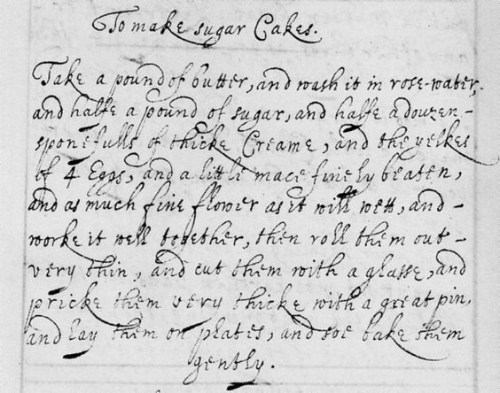
To make sugar Cakes
Take a pound of butter, and wash it in rose-water, and halfe a pound of sugar, and halfe a douzen spoonefulls of thicke Cream, and the yelkes of 4 Eggs, and a little mace finely beaten, and as much fine flower as it will wett, and worke it well together then roll them out very thin, and cut them with a glasse, and pricke them very thicke with a great pin, and lay them on plates, and so bake them gently.
*
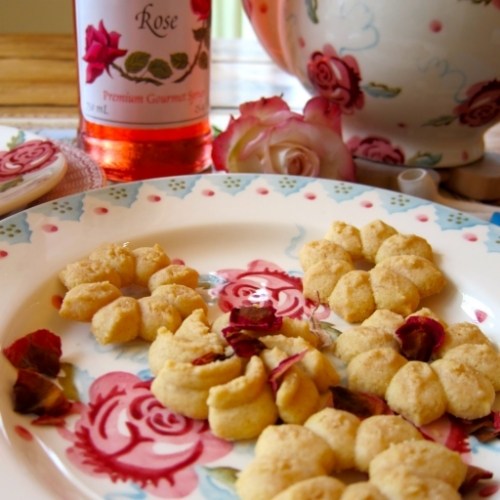
1610 ROSE CAKES
(makes approximately 36 cookies)
- 1/2 cup butter
- 1/2 cup sugar
- 1/8 teaspoon ground mace
- 1/4 cup rose syrup (available at gourmet grocers; or use 1 teaspoon rose water remixed with 3 tablespoons honey and 1 tablespoon water)
- 2 tablespoons cream
- 2 large egg yolks
- 2 cups pastry flour
- 2 tablespoons crushed candied rose petals (optional)
1. Using an electric mixer on medium speed, cream the butter, sugar, mace, 2 tablespoons of the rose syrup, and the cream until light and fluffy. Beat in the egg yolks, one at a time, mixing well after each addition Add the flour, 1 cup at a time, and mix until just incorporated.
2. Preheat the oven to 350 degrees F. Using a cookie press in the shape of a flower, press out the cookies onto a well-buttered, nonstick baking sheet (or drop by tablespoonfuls) and bake for 10 minutes. Brush the remaining 2 tablespoons of rose syrup on the hot cookies and sprinkle with the crushed rose petals.
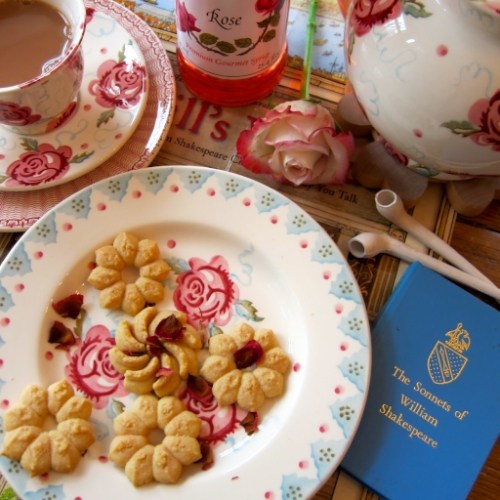
*
A funny thing happened after eating these cookies: I went around saying “a rose by any other name would smell as sweet” for days and Mr Cornelius began coining his own Shakespearean phrases. See for yourself:
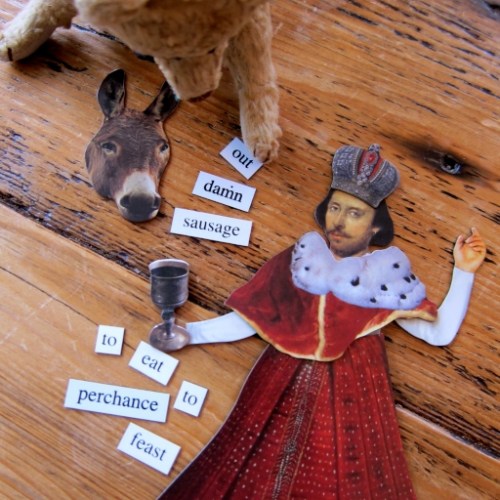
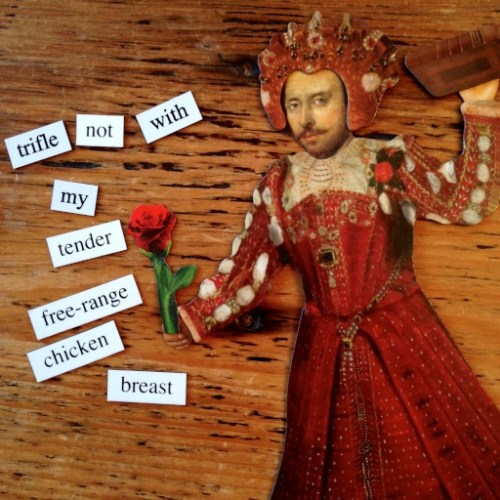
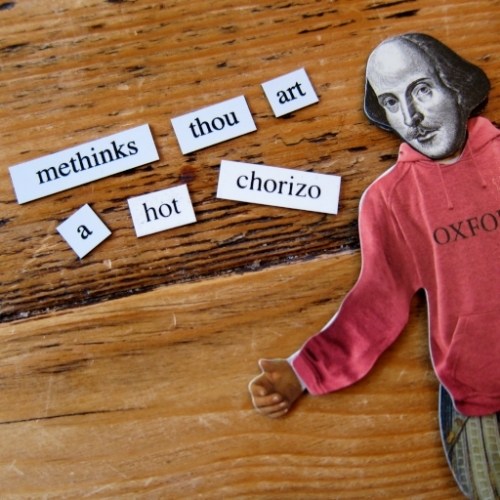

This is just to say . . .
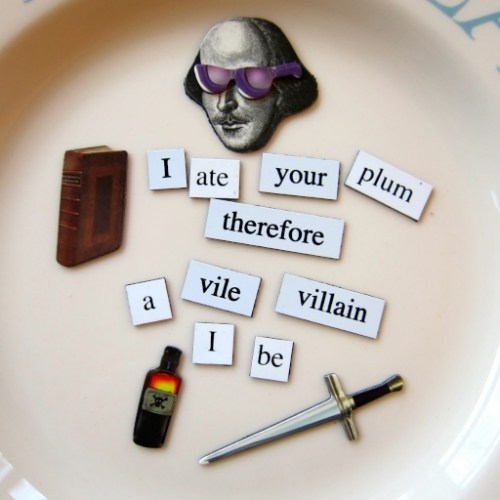
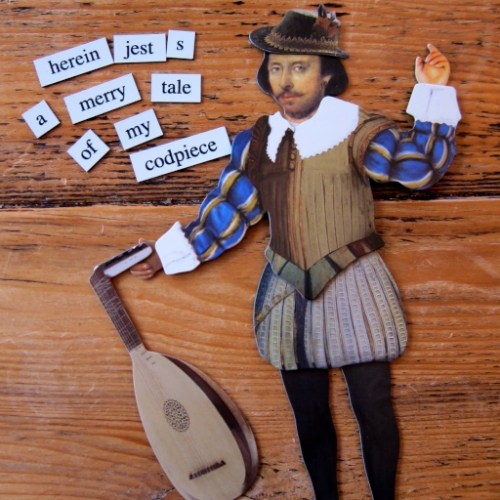
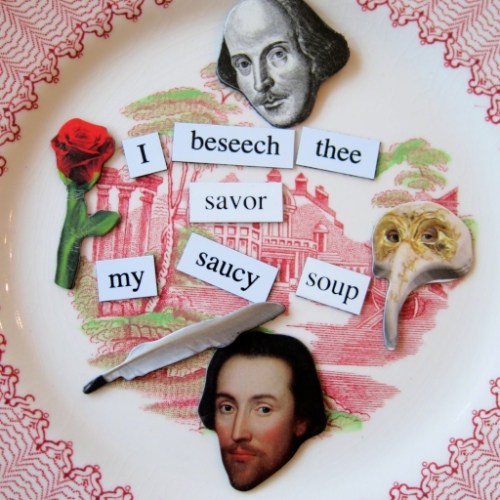
I fear these phrases will pass into common usage. Do you think Will would approve? 😀
Henceforth, Mr Cornelius would prefer to be addressed as “the flaming youth.” As for me, I always thought Desdemona had a nice ring to it.
And now, the game is up!
*
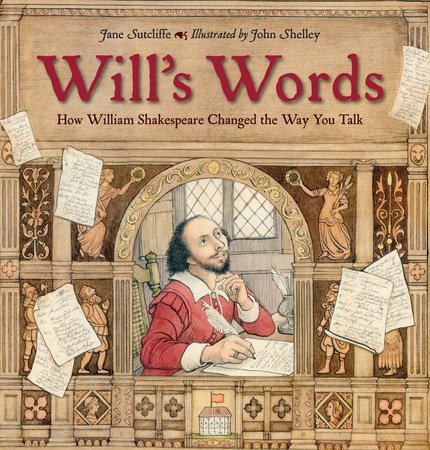
WILL’S WORDS: How William Shakespeare Changed the Way You Talk
written by Jane Sutcliffe
illustrated by John Shelley
published by Charlesbridge, March 2016
Informational Picture Book for ages 7-10, 40 pp.
*Includes Author’s Note, Time Line, and Bibliography
**Starred Review from School Library Journal**
♥ Click here for an Activity Guide with Reader’s Theatre
♥ Check out this great interview with John Shelley at Writing and Illustrating, which includes discussion and sketches of Will’s Words
♥ Curious to test your knowledge of Will’s words? Take this PBS quiz (it’s tough; I only got around 6 correct).
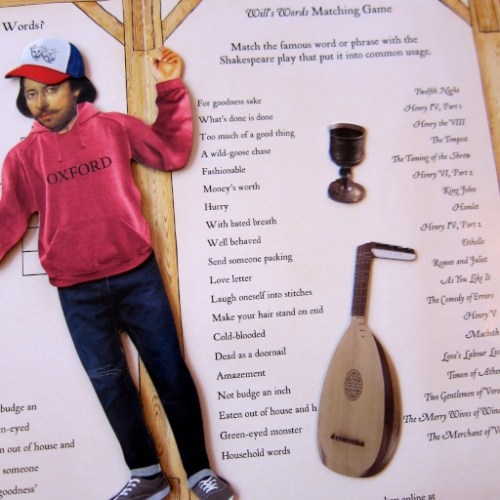
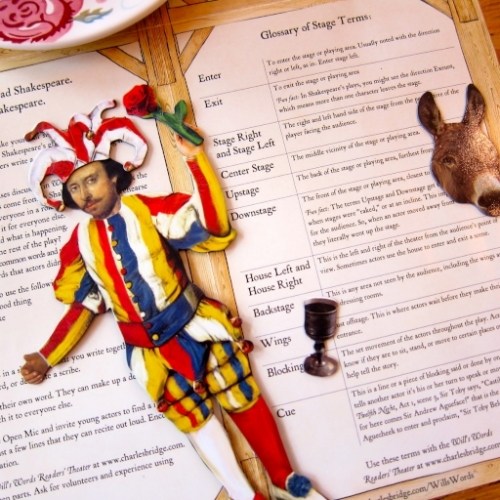
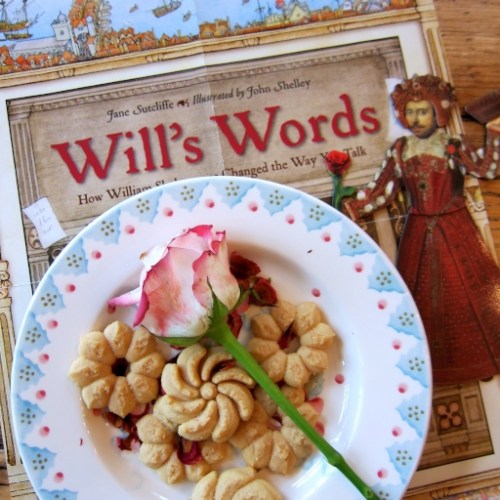
*
📘 SPECIAL BOOK GIVEAWAY! 📕
For a chance to win a brand new copy of Will’s Words, please leave a comment at this blog no later than midnight (EDT) Wednesday, April 20, 2016. You can also enter by sending an email with “SHAKESPEARE” in the subject line to: readermail (at) jamakimrattigan (dot) com. Giveaway open to U.S. residents only, please. Winner will be announced next week. Good Luck!
*
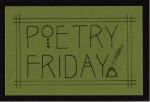 The witty and talented Michelle Barnes is hosting the Roundup at Today’s Little Ditty. Click through, for goodness’ sake, and check out the full menu of delectable poetic goodies being shared in the blogosphere this week. Don’t forget to celebrate Shakespeare’s birthday on April 23!
The witty and talented Michelle Barnes is hosting the Roundup at Today’s Little Ditty. Click through, for goodness’ sake, and check out the full menu of delectable poetic goodies being shared in the blogosphere this week. Don’t forget to celebrate Shakespeare’s birthday on April 23!
And now, I shall vanish into thin air.
Parting is such sweet sorrow . . .
———————————————————————
Interior spreads from Will’s Words posted by permission of the publisher, text copyright © 2016 Jane Sutcliffe, illustrations © 2016 John Shelley, published by Charlesbridge. All rights reserved.
Copyright © 2016 Jama Rattigan of Jama’s Alphabet Soup. All rights reserved.

Oooh! Me, me! I want to win! 🙂 Love John Shelley’s illustrations and would love to read this book! (And I wish I could have sampled those cookies!)
LikeLike
Yes, Shelley’s illos are amazing — I’ve always been a fan of pen and ink, love the details. 🙂
LikeLiked by 1 person
Oh my! This post is a masterpiece, Jama… errrr, Desdemona. Will would be proud… of you, of this spectacular book (the detail in those illustrations!!!), and of course he would be proud of The Flaming Youth. Although Will might regret that he didn’t think of Mr. C’s turns of phrase himself. Methinks thou art a hot chorizo, indeed. Get thee to a kitchen! (As for myself, I’m getting to bookstore to buy this book.)
LikeLike
LOL. I’m glad you think Will would approve. No chorizos in his day, though. I’m sure if he had met Mr. C, he would have written a play about him. Mr C was disappointed to discover Hamlet wasn’t about pork.
LikeLiked by 1 person
Okay, the plum joke is my favorite! Thanks, Jama, this book looks wonderful!
LikeLike
Yes, quite wonderful. Hope you see a copy soon, Kate. 🙂
LikeLike
Amazement! Excitement! Beyond fashionable, this outbreaking post of Will’s Words. (Those illustrations!) Pick me, Desdemona, and my heart (and my eyes and my mailbox) will be content.
LikeLike
Ah, for calling me Desdemona, you get extra points. Yet it will be up to M. Random Integer Generator to pick the final winner.
LikeLike
Mr. Cornelius is a genius!. 🙂 I loved this post and I’m excited to discover a book to help introduce The Bard to my young boys! Maybe we’ll venture out to some Shakespeare in the Park this summer. And I have some rose tea that I think will pair perfectly with these lovely rose cakes! Thanks Jama for another inspiring post! 🙂
LikeLike
Definitely a great book to introduce the Bard to your boys, Valerie. I love the idea of rose tea with rose cakes. Shakespeare in the Park sounds perfect!
LikeLike
A rose is a rose is a cookie in Sgakespeare’s time. My interest in the bars grew when I learned that my ancestor William Rogers built the tavern across from Will’s birthplace as well as Harvard House (John Harvard was his grandson) and is said to be the model for Falstaff. How cool is that?
LikeLiked by 1 person
Wow, that’s SO cool! I did visit Shakespeare’s birthplace years ago, but don’t recall the tavern opposite it.
LikeLike
Methinks this is a post fit for the gods, Jama. The book looks divine, and I love that you did the research for those sugar cakes. Tis also time for Mr. Cornelius to find an agent, right?
LikeLike
Hah! Perhaps you’re right, an agent for Mr C. There’ll be no living with him then. He loves the attention as it is.
LikeLike
I definitely want this book!
LikeLike
Good luck in the drawing!
LikeLike
What a great post, Jama–so funny! I’d LOVE to win a copy of this book! I’ve been waiting for mine to come from the library forever!!
This is definitely my kind of book, as a wordsmith wannabe and lover of words. The illustrations look amazingly detailed too. Can’t wait to read it!! 🙂
LikeLike
I’m sure you’ll like this one, Maria. And — you’re already a wordsmith. 🙂
LikeLike
I SO enjoyed this post, Jama. Excellent review and you had me laughing at the end there! Those cakes look delicious and the rose syrup must have felt magical to work with as I imagine it must offer the treats a taste of spring and summer.
LikeLike
It was interesting to taste the rose syrup in the cookies. Surprisingly it reminded me of citrus, but not as tangy.
LikeLike
To sleep, perchance to dream of winning another book! Be I greedy as MacBeth? Out, out, darn greed.
A very fun post from the Bard of Food, The Divine Desdemona-Jama herself. I love your bard dressed as QE, and the magnetic poetry is hilarious. My set doesn’t have “codpiece.” I’m missing out!
I’ve been to the Globe Theatre in London, back in 1997, when it was fairly new. I can attest to how small and intimate a setting it was. The benches were hard as rock. The Modern QE was not present, but it was an event to remember. I bought my hubby a pair of silver Tudor rose cuff links to commemorate the event. 🙂
LikeLike
Lucky you going to the Globe. I did see a play performed by the Royal Shakespeare Company when I lived in London, but don’t remember what theatre it was. The silver Tudor rose cufflinks sound wonderful!
I like being called the Bard of Food :). Henceforth, I will be forever devoted to thee.
Yours,
Desdemona
LikeLiked by 1 person
And you are Costumer to the Culinary Constellations. 😉 Dresser of Divine Deliciousness. LOL
LikeLiked by 1 person
I would be willing to hear a merry tale of his codpiece, which is pretty surprising…I guess it’s because I’ve savored his saucy soup.
I have never washed butter in rose-water, but now I have a new life goal. Thanks, Jama!
LikeLike
I know, I found that part puzzling — washing butter? Wouldn’t the water simply bead off?
There’s nothing like a good codpiece — I’ve always wanted to wear one myself, just like I wish I could grow a mustache. 😀
LikeLike
I was just flipping through this beautiful book today after purchasing it for my library–gorgeous–and it looks like a very interesting read, as well. Great post, as always!
LikeLike
Yes, it’s gorgeous — love looking at all those wonderful faces, and of course it reminds me of visiting Stratford back in the day.
LikeLike
This whole post is such a hoot. The little Will dolls are so fun! And the illustrations — crammed cheek-by-jowl just like the real London — make Will’s Words perfect. What a lovely introduction for younger readers, before they can be convinced that Shakespeare is drudgery!!!
LikeLike
Yes, it’s definitely a fun way to introduce kids to the Bard. Those teeming masses are quite something. Love the architecture too.
LikeLike
I know so many folks who would love this book – including myself! I’ll have to look for it. Thanks for sharing the news!
LikeLike
I know you’ll enjoy it, Matt!
LikeLike
As always, a rich and wonderful post! Would love to win that gorgeous book, but will plan to buy it, too. 🙂
LikeLike
You’re in for such a treat! Hooray for Will Shakespeare!
LikeLike
Yep, just ordered this. FOR MYSELF. Before even leaving a comment! I am equally bowled over by the text and art and can’t wait to savor. I will blame it on spending all day in the latter part of the 16th Century at a history conference, obviously primed for words from the Bard.
[Mr. C’s “This is just to say . . .” made me laugh out loud!] See you anon! XO
LikeLiked by 1 person
Your history conference sounds really interesting! Mr C had a ball playing with Shakespeare’s words. I fear we have created a monster . . .
LikeLike
A few years ago we were in Saskatoon during the summer and walked along the river past the summer theatre venue. They were doing some Shakespeare play and had banners on the light poles with sayings from his writings. I was surprised at how many common sayings originated with him, as your post about this book bears out which is funny and clever as usual, Desdemona. Your Mr Cornelius cracks me up.
LikeLiked by 1 person
It is surprising — most of us are aware of the phrases we’ve heard so often from the plays, but the individual words and phrases that don’t sound quite so “Shakespearean” are amazing. We are indebted to him more than we realize.
LikeLiked by 1 person
I can’t wait to read this book!
LikeLike
You’re in for a treat!
LikeLike
So stinkin’ much fun! Love the Shakespeare magnets? paper dolls? He looks good in a hoodie!
LikeLike
He does look good in a hoodie. Shakespeare is always cool!
LikeLike
This book sounds marvelous. And the photos of the sweets made my mouth water. Me thinks you are a genius, Desdemona!
LikeLike
A thousand thank you’s!
Yours,
Desdemona
LikeLike
I would write a food book, just to be reviewed on your website, Jama. It is always a joy to visit. Or more like, a giggle! Thank-you.
LikeLiked by 1 person
What a lovely thing to say. Thanks so much!!
LikeLike
Oh my, Jama, be still my William heart! Cornelius’ magnetic wit “I ate your plum, a vile villain I be” cracked me up! Another great post! =)
LikeLike
Eating rose cakes doth make Cornelius wax poetic! You can do the same, fair lady :).
LikeLike
Wow! I need to read this book! As a former English teacher, I too tried to teach kids to appreciate his words. I’m glad this book is here now! I can appreciate it on my own, at the very least. And as I’ve traveled to the recreated Globe Theater in London, I can attest that these pictures are incredibly detailed!
LikeLike
Sounds like this one is right up your alley!
LikeLike
Bravo, Bravo!! The book, the language, the illustrations, and the rose cakes, my heart for this post is clearly on my sleeve!!
LikeLike
Thanks so much for stopping by to read, Jean!!
LikeLike
So sorry I’m too late for the giveaway, but LOVED Cornelius’s new brand of Shakespeare.
LikeLike
Cornelius is hooked on Shakespeare!
LikeLike